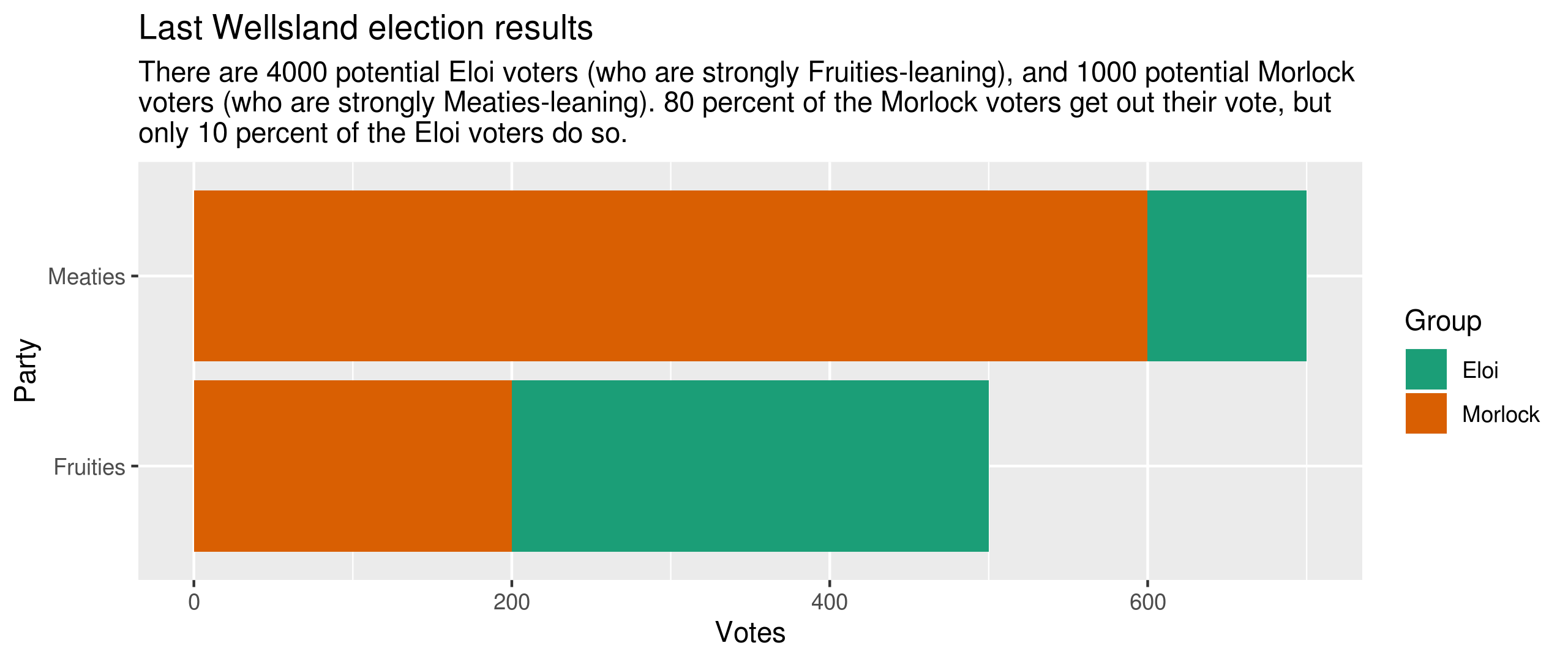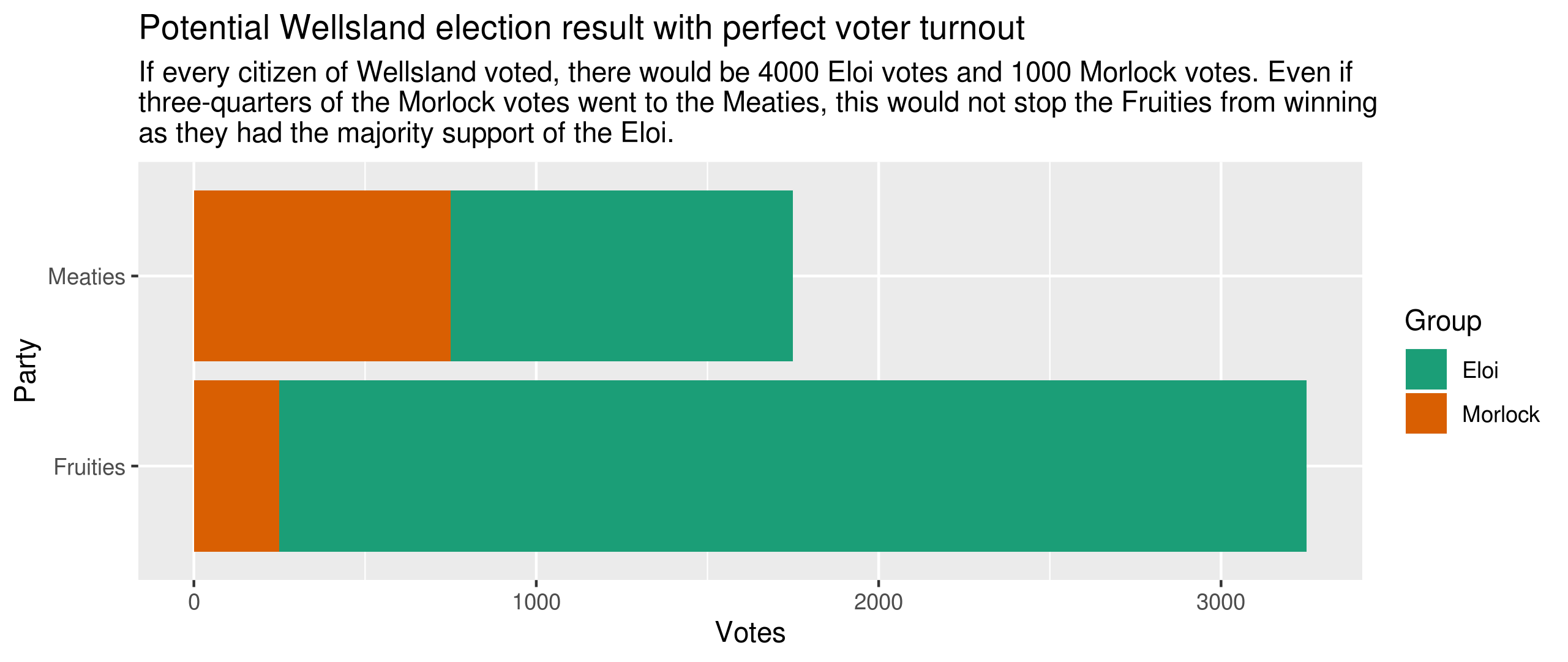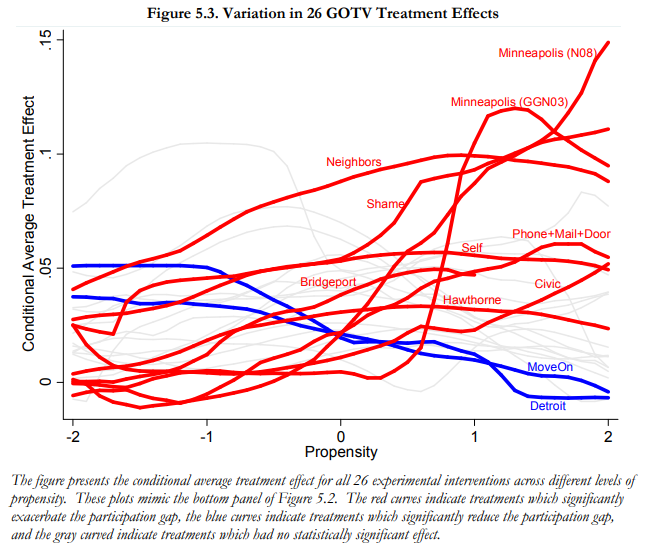Let's look at the fictitious jungle country of Wellsland.
Wellsland has a total population of 5000. This population consists of two ethnicities, the Morlock and the Eloi. There are 1000 Morlock, and 4000 Eloi.
There's also two political parties in Wellsland, the Meaties and the Fruities. The parties don't have equal support among the Morlock and the Eloi. Three quarters of the Morlock support the Meaties, and the remaining quarter supports the Fruities. Among the Eloi, the relation is reversed. Only one quarter of Eloi support the Meaties, but three quarters support the Fruities. In a sense, you could say that the Fruities are the party representing the ethnic majority (the Eloi), while the Meaties represent the ethnic minority (the Morlock).
But that's not the only difference between Morlock and Eloi. Regardless of their political leaning, the Morlock are likely to vote in elections than the Eloi. Consequently, voter turnout among the Morlock amounts to 80 percent, while only 10 percent of the Eloi participate in the elections.
So, comes Election Day in Wellsland. Most of the 1000 Morlock cast their vote, and only a few stay at home. As a result, there are 800 Morlock votes in total. Among the Eloi, the proportion of voters is much smaller, so even though there are four times as many Eloi as there are Morlock, the final vote count includes only 400 Eloi votes.
Consequently, the election results in a victory for the Meaties, the minority party. They received three quarters of the 800 Morlock votes (600 votes), and one quarter of the 400 Eloi votes (100 votes) for a total of 700 votes. The Fruities obtained one quarter of the 800 Morlock votes (200 votes), and three quarters of the 400 Eloi votes (300 votes), for a total of 500 votes. The following graph illustrates the clear Meaties victory:

If there had been a perfect voter turnout so that every Morlock and every Eloi had voted, the election result would have been very different: if every single member of the two groups had voted in proportion to their respective political leanings, the Fruities would have clearly won the election. They would have received 3250 votes in total (250 from the Morlock and 3000 from the Eloi), while the Meaties would have received only 1750 votes (750 from the Morlock and 1000 from the Eloi).

What this shows is that the two parties do not benefit equally from increasing the voter turnout.
For the Meaties, the status quo is the ideal situation. Even though they represent the Morlock minority, they still won the election. For them, there is no incentive to bring more voters to the ballot box. On the contrary, a very smart Meaties strategist might conceive a media campaign that aims to decrease the Eloi turnout even more. Perhaps the campaign sends out the message that clearly the election doesn't matter for the Eloi anyways because their interests clearly aren't represented by the political parties in the first place. If this campaign is successful, the political dominance of the Meaties will solidify even more.
But if the Fruities manage to increase the voter turnout, especially among the Eloi, it becomes more and more easy for them to win the election. It wouldn't even hurt the Fruities if the voter turnout increased also among the Morlock for as long as the increase is larger among the Eloi. The fact that the probability to vote is already high among the Morlock would work in favor of the Fruities – even if every single Morlock voted, the Fruities would need to raise voter turnout among the Eloi only above 25 percent in order to win the election, which sounds like the easier goal.
Consequently, the Fruities might decide to counter the Meaties media campaign (which misrepresents the political reality in order to keep the Eloi voters away from the ballot box) by a postcard campaign. They might plan to send a postcard with "Vote!" printed on it to every citizen of Wellsland. As the proportion of Morlock who vote is already close to the potential maximum of 100 percent, the calculation of the Fruities strategists is that the success rate of their postcards will be higher among the Eloi. Deciding to send the postcards only to the Eloi would increase the chance of success even more, because it's this group in particular that the Fruities want to bring to the ballot box in larger numbers.
So, let's use this Wellsland example to answer your questions:
I keep asking myself - why are they (who?) interested in people going to vote?
It's probably the Fruities who are interested in more people going to vote. They are interested in this because as they represent the ethnic majority (the Eloi), they think it's not really fair if the Meaties win the election just because the Meaties managed to mobilize the minority Morlock better than the Fruities managed to mobilize the majority Eloi.
Why are they spending millions of dollars on these campaigns, what are they standing to gain?
If their campaign was a perfect success so that every citizen of Wellsland voted, the Fruities would win in a landslide. As the Fruities are in a sense the voice of the majority, that voting result would represent the political preferences of the overall population better than the current result in which the voice of the majority is not well-represented.
Even if some people don't vote, wouldn't the interests of the nation be properly (statistically) represented by the people who do get out and vote?
A fair, unrigged election with non-compulsatory voting will indeed represent the interests of the people who got out and voted. The last Wellsland election result does represent the interests of the Morlock and Eloi who voted. More Morlock than Eloi voted, and as Morlock are generally Meaties-leaning, this resulted in the Meaties victory.
However, with increasing voter turnout, the result of an election will increasingly represent the interests of the total population and not only of the people who voted. If every citizen of Wellsland voted, the Fruities would win the election, because there are many more Eloi than Morlock, and most Eloi lean towards Fruities policies.


